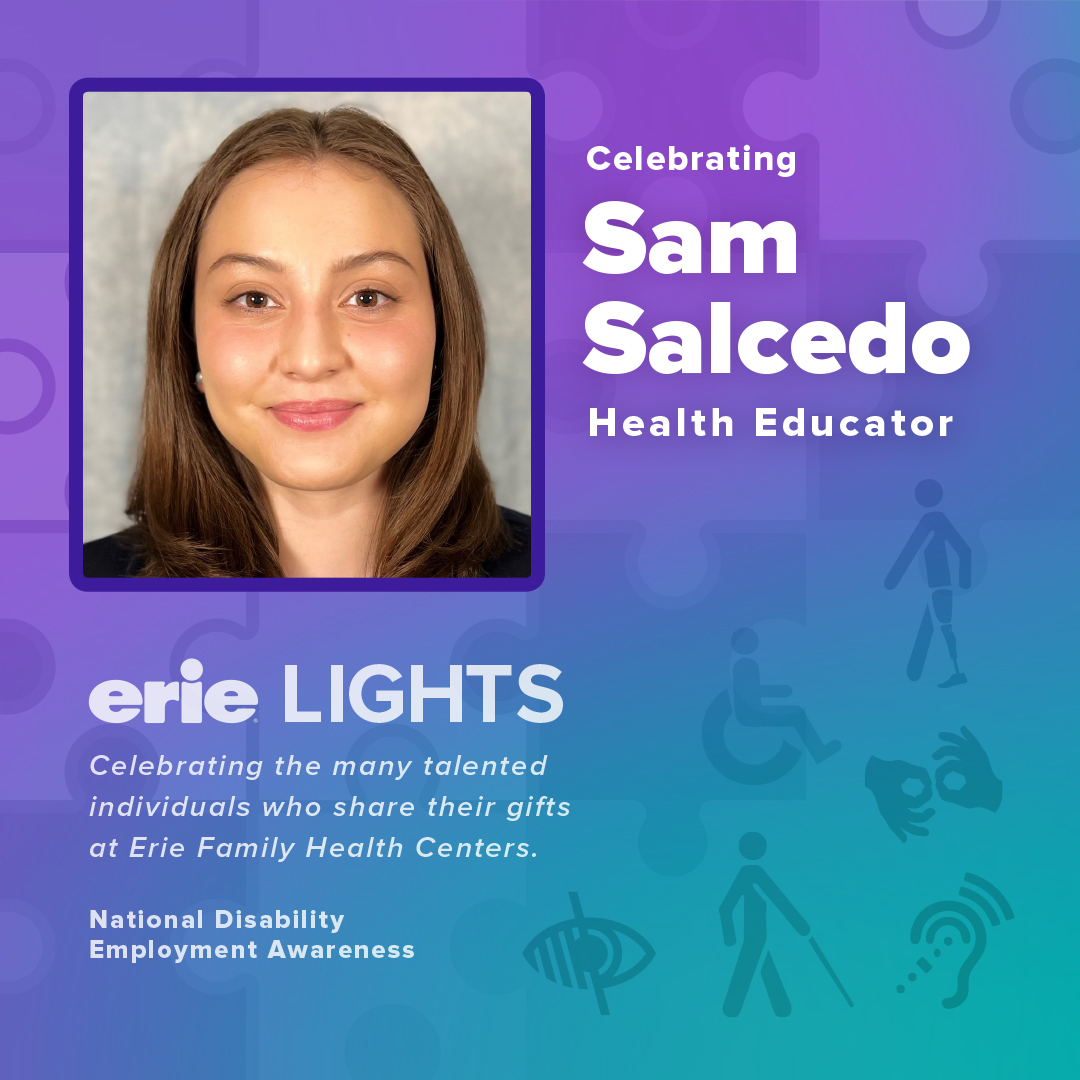
Gurney-native, Sam Salcedo received her Bachelor of Science in Biology with Honors from Loyola University Chicago. Since March 2022, Sam has provided one-on-one education to Erie patients on nutrition, healthy habits, barriers, and more in her role as Health Educator. Sam serves as the Disability Employee Resource Group (ERG) co-chair, a group meant to create a safe space for Erie employees who identify as disabled and raise awareness of the issues people with disabilities face in the workplace. She credits her love for biology and sociology for leading her to a career in public health.
What led you to Erie?
I saw the position for a health educator, and it was everything I was looking for in a job. I wanted to work with patients in a clinical setting and get involved with the community who speak my language.
Sam's Story
I've been sick for a long time. Growing up as a kid, I was always in and out of the doctor's office. It was in high school that everything came to a head. I was getting really sick. I got so ill I dropped out of high school, I got my GED, and they diagnosed me with fibromyalgia when I was 17. And it was a long road to get there. They did all the tests. They tried everything to figure out what it was. And once they ruled everything out, the only thing left was fibromyalgia, a pain disorder. I was doing all right when I went to CLC in Grayslake. However, when I transferred to Loyola, the stress of moving away and living alone for the first time was when I truly became disabled. I couldn't walk, couldn't take care of myself. I did graduate, but it was difficult; it was challenging. Now that I'm back home and managing it much better, I think that was a lot. I believe that part of being disabled is that you realize or take for granted how challenging something can be, and it just opens your eyes to all the ways things can be improved around you.
What does Disability Employment Awareness Month mean to you?
I became disabled in college. I had been active before that, and I got sick. Suddenly, I was left trying to not only figure out what it meant to be disabled on a personal level, but I also had to learn how to advocate for myself in school because I needed accommodation at the university, which was hard in the beginning. At first, it was hard to come to terms with it. My life was going to be different from here on out. Then I guess learning there's no shame in it because it's not something we talk about very often, but it can happen to anyone. Join the ERG so we can talk about it in a workplace setting and make changes from there.
What are your goals for the Disability ERG?
Being the co-chair, I understood that Katherine primarily wanted it to be a peer support group. Honestly, I have been looking for a support group since I became disabled, mainly being so young and having to use a cane. I only sometimes use it, so people may not know right away that I have an invisible disability or illness. It was hard for me when I became sick and disabled not to be able to connect with my team that way. I want this to be a place where everyone feel like they belong, with others who understood it means to be disabled and constantly having to advocate for themselves.
What is something that many people don't know about you?
During the pandemic, when we were all stuck at home. I started making jewelry, and I do sell jewelry on the side now. I like embroidered handwoven pieces, so that's something I do for fun. I sell at a little store in Grayslake. I used to be an active person; I played tennis. I would run. Since I got sick, that's just a lot more difficult. I have to be mindful of how I choose to use my energy. So, sitting and waving is the perfect activity for someone like me.
What other activities do you enjoy doing in your free time?
I do everything with my dog. I have a dog named Ruby. She's my whole world. She's twelve and a grandma, but we have about the same energy level—me with my spiral, her being a grandma. But we do everything together. We do my jewelry together. We go for walks; we go to the store. If I'm not at work, I'm with Ruby. We adopted her during the pandemic.
There's an initiative to hike all the trails in Lake County. So, we're working through that list.
Because I'm a health educator and I have fibro, I know how essential exercises, even if it's hard, so we were doing it together, walking all the forest preserves around here.
Would you say that your diagnosis inspired your career choice?
Absolutely. I had grown up at the doctor's office. I've been there since I was a baby, in and out, with different things that were just not right. And I wanted to be involved in the medical field, including clinical aspects. But growing up with my family of immigrants from Ecuador, I could see all the barriers for people who looked like my family and me, especially in college and through school. I wanted to use the language my parents taught me growing up and combine the two in community work, especially in the clinic.
What is your favorite Fall activity?
I like apple picking and baking all those recipes from Ecuador. I don't tolerate the heat so well, so definitely getting outside with the cooler weather. So, hiking with Ruby, baking, apple picking, and pumpkin stuff, fall is my favorite season.
What is something you wish people knew about people with disabilities?
I know everyone has different ideas of disability because it doesn't look the same for everybody. I know sometimes I don't "look disabled," but sometimes I need my cane, and sometimes I'm okay. The pain comes and goes. So every day looks a little different for me, managing it daily. Even with my team, I haven't shared my disability, so I think this might surprise some people. With Disability ERG, I'm excited to share my experiences and hear everyone else's stories. I've never had that before. So, people wouldn't look at me funny when they saw me walking with my cane and stuff like that.
How do you feel like you are breaking barriers in the workplace?
The first is that there is nothing shameful or to be embarrassed about with disability. The hesitation to disclose it makes you stop and think. I hadn't shared it with my team before. The ERG wasn't something I was planning on mentioning ever. It's always been a little difficult for me, probably because of the stigma in our society. I think joining the ERG, and just by being a little more open and honest about it, is a first step in showing other people they can do it, too, because we never know what people have going on in the background. Second, it brings a new perspective, especially my health education appointments. You understand maybe the limits that people may have that they don't feel like talking about, but you also see the world from a new perspective. I understand the importance of having chairs that accommodate everyone, being able to walk, and why exercise may not always be necessary, but finding ways that we can include everybody in these lifestyle changes that I talk about so much in my appointments.
What is one thing everyone can do to destigmatize disability?
The first thing is to think about it with an open mind. I think the reaction I've experienced when walking with my cane is that people will stop and stare. They look because it's odd. So just separating those ideas of disability from looking like any particular person, age, or color will help us understand that some illnesses are invisible, and some disabilities are invisible. That open-mindedness can help understanding on a broader scale.
